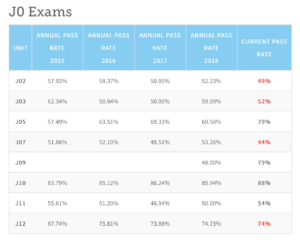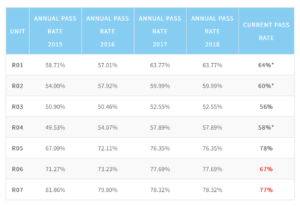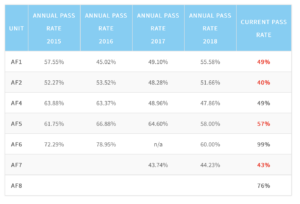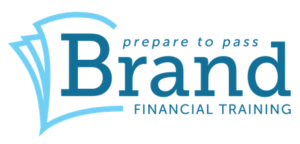The Brand Financial Training team look at a selection of CII qualifications and their exam pass rates.
This post was originally published on the Brand Financial Training Blog at https://brandft.co.uk/organise-your-study-notes/ and has been reproduced here with their permission. All content © Brand Financial Training.
The current CII exams pass rates have now been published. Those who are planning to sit CII exams in the near future will want to know how past exam candidates have fared.
The CII has changed the way they publish the annual pass rates on their website. For most exams, the pass rates are now listed on individual unit pages as “The pass rate for those completing the unit is currently XX%”; though it’s not clear as to what ‘current’ means.
We’ve done our best to collate the pass rates for you, and the pass rates discussed in this article are as at 17 March 2020. There are a few that, due to newly introduced rounding to zero decimal places, appear as if they have not yet been updated.
Looking at the Diploma first, current figures show pass rates range from 44% to 88%. J10 (discretionary investment management) always has an impressive pass rate and still holds the top position with 88%. J09 is the paraplanning coursework module, and this had a pass rate of 48% in 2018, which has now jumped to an impressive 79%. Both J02 (trusts) and J03 (tax and legal aspects of business) have dropped back again, but J05 (pension income options) is showing an impressive increase.
The figures in red show where the pass rate has dropped from 2018 figures, which you can see, applies to half of the J0 units.
R0 Exams
For the R0 units, we have five units showing increased pass rates with only two dropping – namely R06 and R07. It’s encouraging to see R03 (personal taxation), an exam that students have tended to struggle with, continue to show improved figures.
* Due to the introduction of rounding to zero decimal places, these appear as if they have not yet been updated.
AF Exams
With the advanced subjects, we can see that after a couple of years of a rise in delegates passing AF1 (tax and trusts), we now see a decline. The numbers for AF2 (business planning) have also gone down as have the numbers passing AF5 (financial planning process) and AF7. It’s good to see the numbers for AF4 (investment planning) creeping up – albeit marginally – but the surprise result has to be AF6, which shows a staggering 99% of students passing. AF8 (retirement income planning) figures are also now being published, and they are also showing an impressive 76% of students passing; although it’s not clear of course if this is first time or after further attempts at the assignments.
In summary, the J0 exams show equal increases and decreases. The multiple-choice R0 exams show good signs of improvement, with the written R06 paper dropping by almost 11%. It’s interesting to see that AF2 has taken over as the advanced financial planning exam with the lowest pass rate, showing a significant drop from previous figures (although AF7, the pension transfer exam not too far in front) but with both coursework exams showing impressive results.






























